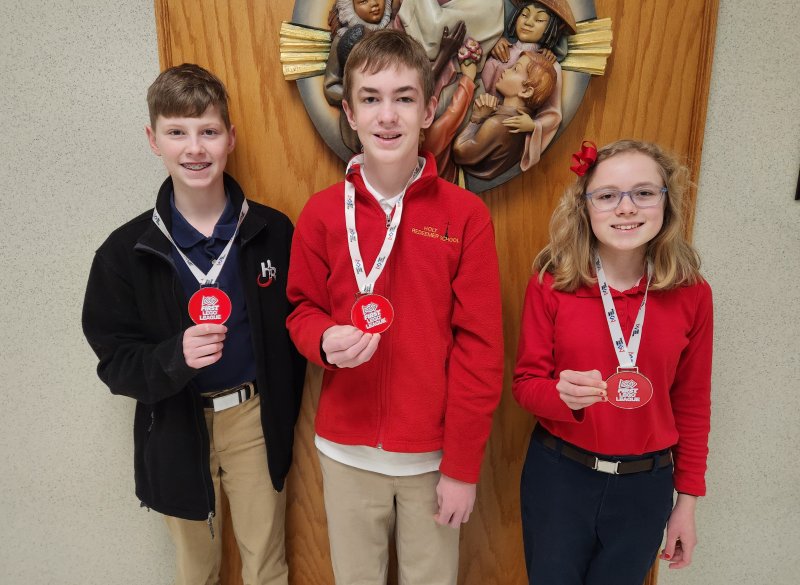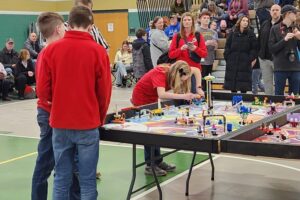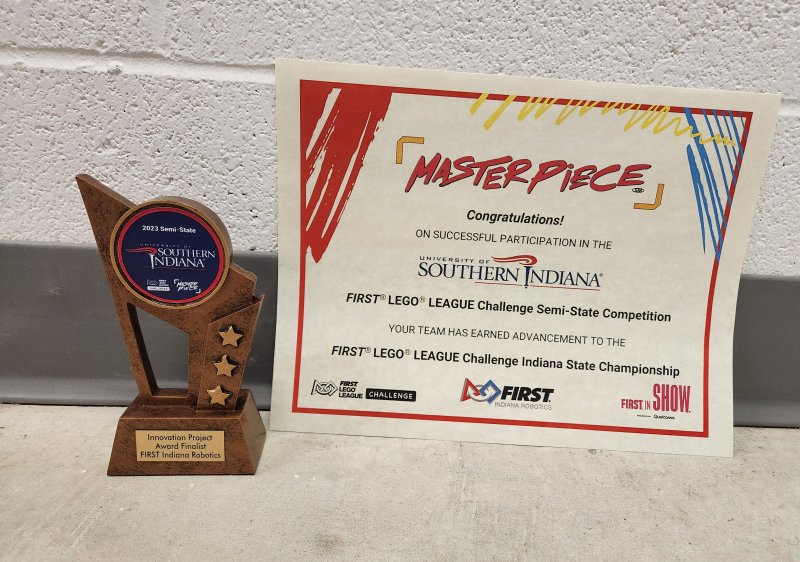By John Rohlf
The Message assistant editor

For the first time in school history, the Holy Redeemer School robotics team, The Rockets, competed at the FIRST LEGO League state championship.
Despite having only three students participate on the team this school year, Holy Redeemer advanced through the qualifying round and the semi-state tournament to qualify for the state tournament. Eighth grader Xavier Schrage and seventh graders Cole Sexton and Claire Schmitt began working on their robot in August and competed at the state competition earlier this year.
For the competition, the team members’ theme for their project was band. All three members of the team are members of the band, Coach Matt Schmitt said. In addition to building the robot, they also had to deliver a presentation and answer questions on their presentation.
With all three team members in the band, they focused their presentation on trying to increase membership in the band.
“We also had to have presentations on how we designed our robot,” Claire Schmitt said. “And we also had our innovation project, which we had to pick a topic. So we picked band and were trying to use technology to get people to join band was our idea.”
Coaches Derek LeDuc and Matt Schmitt stressed the students mostly completed the project from scratch on their own. LeDuc said they would look at a coding issue if needed but added it is always the students running the tests.

Claire Schmitt said they found a resource online that showed them step by step how to build the robot. As the season went on, they added their own unique twists, including the addition of tires to help get more power. They also used a rubber band to help with slipping.
“We had to make some alignment jigs,” Schrage added. “And we had to make some parts entirely from scratch…”
While most of the focus goes towards the robotics competition, that is only one of the four aspects of judging during the entire competition. They are also judged on the innovation project, their robot design and core values.
For the other categories, they go in front of a panel of judges. LeDuc said the judges for those categories are generally experts in their specific field.
“They’re having to give these 5-10 minute presentations and then are judged immediately and given feedback on it,” LeDuc said. “Which is something when I was that age, I never would have probably had the courage to do. So I mean every time they went in there, it was always impressive how well they presented themselves and spoke on these pretty large concepts and spoke to that.”
Matt Schmitt added they had to answer questions without time to prepare answers.
There is also a strong amount of pressure in competing in the robotics competition. LeDuc cited the 150 second window they had to complete individual tasks.
“Basically, you have your big area that everyone is in,” Sexton said. “First, you just kind of unpack your things there. And we just sometimes would set up our own table so we can practice apart from the competition. And then whenever it was our turn, there would just be two tables that were set up side to side. One opponent and then your table. You just set up your robot there.”
The Rockets made it to their first ever FIRST LEGO state competition despite having a smaller team than most at the competition. LeDuc said they were “a smaller school compared to others.”
Coach Matt Schmitt said the number of students interested in competing varies based on the year. He noted the school’s seventh and eighth grades are the two smallest grades in the school. He said a team size of three to six students is ideal.
Overall, Sexton said the experience of building the robot and competing in the various competitions “was pretty fun.”
“I enjoyed building the Legos and the set,” Sexton said. “Our entire model was built on a set except all the attachments that were added on. I enjoyed that and coding it too.”
LeDuc and Schmitt both think the experience will be beneficial for the students in the future. Schmitt noted the practices and competition required teamwork and working together. They also needed to present in front of others and answer questions, Schmitt noted.
LeDuc added they were able to travel and learn programming skills.
“It helps with critical thinking skills, helps lateral thinking,” LeDuc said. “Get to meet new people, especially at the competitions. There’s hundreds of kids that are running around, talking with each other, meeting each other. There’s tons of great experiences with it…”

